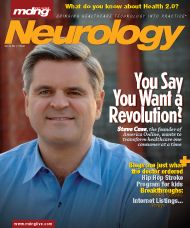Specialists on Call Leverages Telemedicine into Successful Business Venture
The notion that neurologists can take advantage of well-established video transmission technology seems so obvious that it makes one wonder why its adoption is so limited.
The notion that neurologists can take advantage of well-established video transmission technology seems so obvious that it makes one wonder why its adoption is so limited. Why rush out of an office crowded with patients, or worse—out of a warm bed—to see a patient in a remote emergency room when the information needed to make a management decision is just a click away on the nearest Internet-enabled computer? What factors have contributed to the relative lack of adoption of tele-neurology when other fields, such as teleradiology and tele-psychiatry, are well-established endeavors?
Specialists on Call (SOC) provides remote emergency neurological consultations in real time by means of telecommunications. We have all been performing phone consults for years, but now we can add the ability to interact with a remote patient visually. Evidence shows that a neurological examination done using a video camera is as reliable as one performed in person.1-3 Furthermore, patient acceptance has been demonstrated as well. Th ere are several published examples of how this technology has been successfully employed to intervene in the management of stroke patients.4-15 Because “Time is brain,” the more rapidly tissue plasminogen activator (t-PA) can be administered, the better. Colin McDonald, MD, a MGH-trained Neuro-ICU and stroke specialist, founded Brain Saving Technologies to supply neurology telemedicine services to hospitals that were not administering t-PA to acute stroke patients. About one year ago, Joe Peterson, MD, came on board as CEO and renamed the company; SOC has since refined its business model and expanded its market penetration. It currently provides emergency neurological consultations in emergency departments and intensive care units in MA, NJ, VA, TN, MS, FL, TX, and CA. As the name change implies, SOC hopes that its telemedicine coverage will expand into other areas of medicine.
Th e company uses sophisticated videoconferencing technology, systems that enable the remote neurologist to access digital images from PACS systems, and systems that distribute consultations to the pool of SOC physicians. Dr. Peterson emphasizes that the technology aspect of his company is really only a means to the end of providing a valuable patient care service. It is the relationships that develop between emergency department doctors and neurologists that drive the success of SOC.
SOC contracts with hospitals on a subscription basis depending on the number of beds covered. The economic advantages to the hospital are clear: ambulances don’t bypass them for hospitals that are better equipped to handle acute strokes, and those patients do not have to be transferred to another facility for their acute and rehabilitative stays.3,16 How do the local neurologists perceive SOC? In 100% of the locations where SOC provides clinical telemedicine, the relationship is very cordial, since they are non-competitive. SOC provides only a small portion of the neurological competence required in a community hospital setting. Patient management reverts back to the local neurologists after the acute after-hours event has been managed. Medicine is becoming divided along inpatient and outpatient lines. Services such as SOC enable those neurologists who are more interested in outpatient clinical neurology to concentrate their eff orts in that arena. The SOC—local neurologist relationship is collaborative and attractive to neurologists where the service exists.
None of the SOC neurologists are performing telemedicine full time, which is by design. SOC feels that physicians need to remain active in the care of hospitalized patients to keep their acute care neurology skills honed. Today, the service of providing
coverage for neurological emergencies is a niche business. However, finding specialist coverage is becoming increasingly more difficult. Furthermore, the financial pressures to provide “quality” medical care—such as pay for performance initiatives—will increase the demand for specialist services. Given the convergence of technological advances and current medical forces, it seems that SOC is well positioned to continue its success.
Dr. Zuckerman is an MDNG Healthcare IT Advisory Board member, and the Chief of Neurology and Medical Information Officer at Baton Rouge General Hospital in Louisiana.
